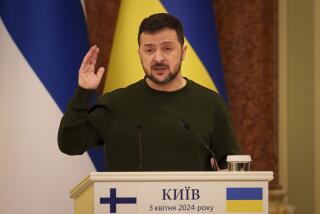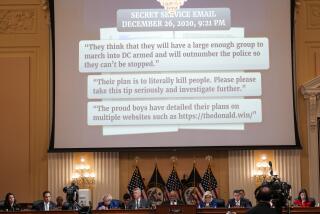Bomb and Baboon Plots by Secret Army Unit Admitted by S. Africa
- Share via
JOHANNESBURG, South Africa — In an extraordinary public inquiry into allegations of state-supported political assassinations, South African military officials admitted Monday that members of a secret army unit tailed anti-apartheid activists, planted a bomb at a township meeting hall and plotted to send the fetus of a baboon to Anglican Archbishop Desmond M. Tutu.
The disclosures came on the first day of a judicial inquiry into military and police participation in political hit squads, and testimony focused on the underground Civil Cooperation Bureau, a shadowy military unit composed of civilians and former policemen.
Justice Louis Harms, the investigating commissioner, was told that Col. Joe Verster, commanding officer of the bureau, had been arrested Friday by police investigating the assassinations last year of anthropologist David Webster and Anton Lubowski, the only white executive member of the South-West Africa People’s Organization in Namibia. Verster is being held under security laws that allow for indefinite detention without trial.
The first witness, Gen. Rudolph Badenhorst, head of the military intelligence branch of the Defense Force, testified that the bureau had blown up a Pretoria store owned by an anti-apartheid activist and exploded a bomb at a community hall.
He also said two former policemen employed by the bureau had devised “Operation Apie,” which was intended to deliver the baboon fetus to the Cape Town home of Tutu, the Anglican archbishop and 1984 Nobel Peace Prize laureate. He did not explain the significance of the form of harassment.
Tim McNally, the investigating state attorney, said the police had compiled a list of 71 cases of unsolved, politically inspired murders of anti-apartheid activists. And he accused Maj. Gen. Eddie Webb, the bureau’s chairman, of being involved in the murders of Webster and Lubowski as well as a plot to kill Dullah Omar, one of recently freed black nationalist Nelson R. Mandela’s attorneys, by substituting lethal pills for his heart medication.
In his testimony, Webb denied plotting to kill Omar, and both he and Badenhorst denied any military role in the Webster and Lubowski slayings. However, Webb acknowledged that the bureau was a covert branch of special forces whose mission was to gather information on enemies of the state both inside and outside South Africa.
Defense Minister Magnus Malan said in a statement that he had first learned of the existence of the bureau in November and had assigned Badenhorst to investigate.
Malan, who has said he never authorized any illegal acts, said he informed President Frederik W. de Klerk about the squad in January.
More to Read
Sign up for Essential California
The most important California stories and recommendations in your inbox every morning.
You may occasionally receive promotional content from the Los Angeles Times.












